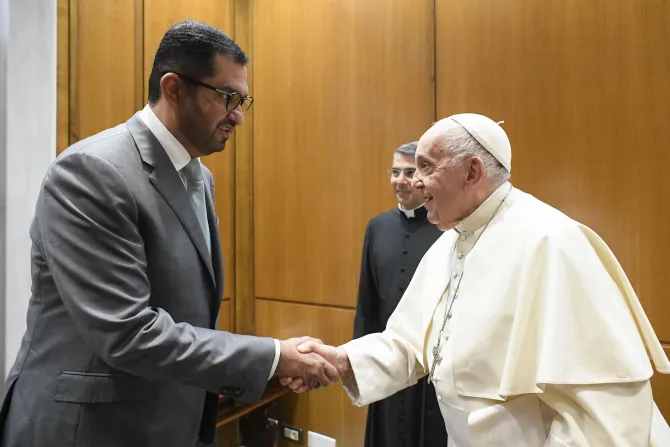Pope Francis received Dr. Sultan Al Jaber, president-designate of COP28 UAE, on Wednesday at the Vatican. The meeting comes ahead of the COP28 meeting taking place at Expo City Dubai from Nov. 30 to Dec. 12.
The Conference of the Parties (COP) is an annual conference that was established after the signing of the United Nations Climate Change Conference (UNFCCC) treaty in 1992 at the U.N. Rio Conference, also known as the Earth Summit.
The COP represents all the states that are party to the UNFCCC and is an opportunity for world leaders, representing state and nonstate actors, to meet and discuss policy goals that seek to establish common — and often ambitious — goals for climate change mitigation.
Some of the main goals of COP28 include decarbonization, meeting net-zero methane emissions by 2030, changing financing mechanisms for sustainable energy transition, and developing equitable and inclusive systems.
During their meeting Oct. 11, Pope Francis and Al Jaber discussed the role that faith leaders and faith-based organizations can play in promoting the climate objectives of COP28.
A key initiative for faith leaders will be a global summit called the Confluence of Conscience, which will take place on Nov. 6-7 in Abu Dhabi, according to a COP28 press release. “The COP28 presidency will also co-host the Faith Pavilion at COP28, marking the first-ever pavilion of its kind at a COP event,” the press release said.
Al Jaber also took the opportunity to thank the Holy Father for his efforts in promoting climate change advocacy.
“I want to thank the Vatican, under your papacy, for its work in advocating for a higher ambition on climate action and social justice. Your update of the 2015 Laudato Si’: On Care for Our Common Home to bring it up to date is truly inspiring. We aim to ensure that COP28 amplifies the call to action from religious leaders, and we plan to do this through the global faith leaders’ summit in Abu Dhabi,” Al Jaber said.
“Without a doubt, your intervention and advocacy for action will inspire millions and will help us raise the ambition at COP28 that we urgently need to course correct. Also, I would like to ask you to send a representative of the Vatican to the global faith leaders’ summit in Abu Dhabi,” he continued.
Al Jaber was announced at the president-designate of COP28 in January. He is also the United Arab Emirites’ minister for industry and advanced technology and special envoy for climate, chairman of Masdar, a renewable energy company based in Abu Dhabi, and CEO of the Abu Dhabi National Oil Company.
Currently, there are 198 parties to the UNFCCC. The Holy See acceded to both the UNFCCC treaty and to the 2015 Paris Climate Accords (also called the Paris Agreement) in 2022 as a non-Annex I party (Annex I parties are legally bound to reduce greenhouse gas emissions; non-Annex I parties, typically developing nations, are only required to report emissions.) In accordance with Articles 3 and 4 of the Paris Agreement, the Vatican City States has still committed itself to reducing greenhouse gasses to 20%, below 2011 level, by 2030.
The Holy See expressed that its accession would allow it “to contribute and to give its moral support to the efforts of all states to cooperate, in accordance with their common but differentiated responsibilities and respective capabilities, in an effective and appropriate response to the challenges posed by climate change to humanity and to our common home.”
Advocacy for climate change has been at the center of Francis’ pontificate. His seminal 2015 encyclical Laudato Si’ underscored the ethical obligation to protect the planet from the most deleterious effects of climate change as well as the moral imperative of building new systems to combat poverty and to reach a sustainable level of development.
On Oct. 4, the pope published his much-anticipated apostolic exhortation Laudate Deum, which is seen as the second installment of Laudato Si’.
“Eight years have passed since I published the encyclical letter Laudato Si’, when I wanted to share with all of you, my brothers and sisters of our suffering planet, my heartfelt concerns about the care of our common home. Yet, with the passage of time, I have realized that our responses have not been adequate, while the world in which we live is collapsing and may be nearing the breaking point,” the pope wrote.







